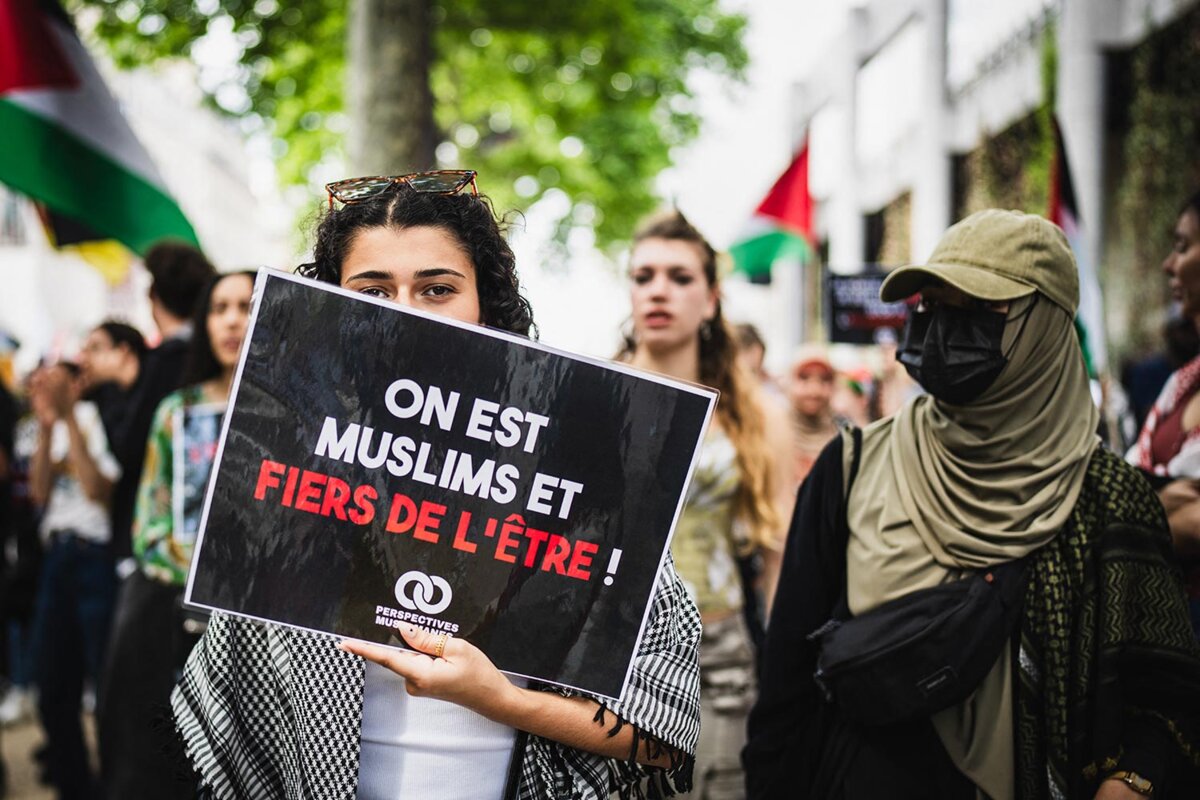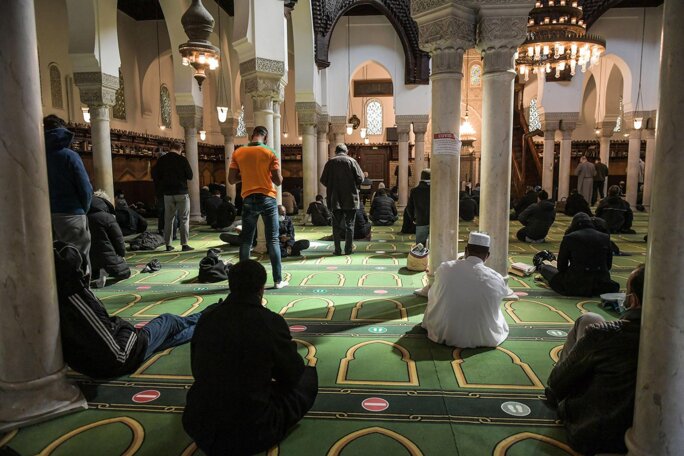A report entitled 'Frères musulmans et islamisme politique' ('The Muslim Brotherhood and political Islamism') was presented on Wednesday May 21st to France's Defence and National Security Council. The document says the Brotherhood – founded in Egypt in 1928 - has a strategy to gain a foothold in French life. The report immediately led to a demand from President Emmanuel Macron for new measures from ministers to tackle what the document's civil servant authors call a “threat to national cohesion”. In a separate move, former prime minister Gabriel Attal is set to propose a ban on the wearing of the Muslim headscarf or hijab for anyone under the age of 15.
In an interview with Mediapart, academic Franck Frégosi, director of research at the French National Centre for Scientific Research (CNRS) and author of Gouverner l’islam en France, ('Governing Islam in France') published by Seuil in 2025, analyses the political manipulation of information that was, for the most part, already in the public domain. He also voices his concern over the ever-more oppressive climate faced by Muslims in France.
Mediapart: You were questioned, like many other researchers, for the report put before the defence council today. Some refused to participate, calling it a public relations exercise by the Ministry of the Interior. Why did you agree to take part?
Franck Frégosi: First, one must remember that this report was commissioned by Gérald Darmanin [editor's note, then interior minister, now justice minister] just over a year ago. He told the Journal du dimanche [newspaper] that he wanted a report on the Muslim Brotherhood, and even said he already knew what it would say. That worried us a bit. Some researchers refused to be involved for that reason in particular.
I accepted because I think it's appropriate for the authorities to chart the forces shaping Islam in France. It's a good thing that they turn to the academic world, as well as to intelligence sources.

Enlargement : Illustration 1

Among researchers there are different analyses of these issues, and the report's authors told us they would take that range of views on board. But we don't know how much the report that has been presented was altered. That sensitive bits have been removed is fair enough, but beyond that we don’t know if it’s been tweaked here and there or not.
Mediapart: What do you make of its contents?
F.F.: Beyond what I’d call a slanted way of setting things out, and I’ll come back to that, in substance we don't learn a lot. The report describes a Brotherhood running out of steam worldwide and in the Middle East, which is quite true. This decline is in part due to political repression of the movement, as seen in Egypt and Saudi Arabia.
The Muslim Brotherhood began to take root in Europe in the 1950s and worked to reconnect people from migrant backgrounds with the core teachings of Islam, in line with their own quite orthodox and conservative outlook. They helped contribute to the creation of religious and social groups, and above all they have changed over time.
But I think it’s important to say that those we called the “Muslim Brothers” at that time are not the same as those who are now said to belong to that movement.
Mediapart: So who are we really talking about when we speak of the Muslim Brotherhood in France today?
F.F.: To begin with, no group in France openly says it belongs to them. Manuel Valls [editor's note, former prime minister and interior minister and currently overseas territories minister] wants to ban the Muslim Brotherhood – that’s quite something!
There are groups, such as the UOIF [editor's note, the Union des organisations islamiques de France], now called Musulmans de France, that indeed say they follow the ideas or spiritual line of the Brotherhood’s founder, Hassan al-Banna. Over time, ties with the original group have grown weaker. There’s been a generational changing of the guard, and above all a lot of work has gone into adapting faith to fit the French setting.
Unlike movements such as the Salafists, who aim to push one-size-fits-all Islam across the world, those who follow the Brotherhood's line grasped that they had to pay attention to the context in which Muslims were living, which has little to do with the the majority Muslim context of the 1920s colonial world of Hassan al-Banna.
There is a great deal of plurality now within this movement. What I show in my book is that this group has been outpaced by Salafism, and is now struggling to bring in fresh leaders, many of whom have become what my fellow scholar Margot Dazey calls “community worthies”. Since the 1980s and 1990s, they’ve found it harder to mobilise interest among young people in particular.
Mediapart: In his remarks based on this report, interior minister Bruno Retailleau talks of a movement that wants to impose “sharia” in France and “set up the caliphate” – strong, and worrying words for a public largely unaware of Muslim religious life. What should we make of that?
F.F.: The report says no such thing, it doesn’t talk about that.
Sharia is what’s called Islamic law. In Islamic tradition, part of this law is drawn from verses of the Qur’an and the traditions of the Prophet [editor's note, his sayings and deeds], dealing with targeted matters such as worship, social life, and also crime and even financial issues.
So there are several levels and layers. In France, the priority of those attached to the Muslim Brotherhood’s school of thought is strictly linked to the issue of worship. The group Musulmans de France, for one, has never spoken of bringing in a personal law code, something that is still debated in some North African lands where Islam is the main faith. So we're not talking about the criminal laws seen in Saudi Arabia – hand-cutting for thieves, whipping for those committing “adultery”, and so on.

Enlargement : Illustration 2

The same goes for the caliphate. This aim has long since been dropped by members of the movement in Europe, as [editor's note, fellow academic] Brigitte Maréchal’s work clearly shows. Talking about that is a way to stir a kind of moral panic. But for some in public life, it helps establish the idea that Muslims have no place in Europe.
Mediapart: What do you mean by that?
F.F.: The report puts things such as fasting during Ramadan, wearing the veil, shops marked as halal - one could also add [the issue of] sports clubs - all on the same level.
All of it is taken as a hint, a sign even, of a bid to make society more Islamic, with the end goal being what we’ve just talked about: sharia and the caliphate. The allegation of Brotherhood-style “infiltration” is a pretext for yet another row over the place of Islam in public life. It’s about rekindling a sense of fear, linking it to the visible parts of Islam, which is a dire thing to do.
And even when Muslims adapt their worship to fit the European context this, too, is seen as suspicious, as though something is being hidden. We are being fed a narrative of a growing Islamisation of French society, with hints of the “great replacement” theory [editor's note, a far-right conspiracy theory] behind it. At heart lies the idea that Islam in France is something fundamentally alien.
So it’s no wonder Muslims in France are asking what place they have in this country. And it's hard to overlook the fact that the presentation of this report, and the strident talk surrounding it, comes just weeks after the killing of Aboubakar Cissé in a mosque [editor's note, in southern France in April].
Mediapart: In this light, doesn’t the report back the controversial idea that there's a continuum between political Islam and jihadism? That is, the idea that there’s a kind of “fertile ground” or “ecosystem” which may indeed be lawful and peaceful but which is still potentially dangerous as it might lead to radicalisation?
F.F.: Yes, and in my book I look at the role of some scholars in this in relation to the public authorities. This theory of a continuum, long backed by [academics] Gilles Kepel, Bernard Rougier and now Florence Bergeaud-Backler, has coincided with the strategic interests of some political leaders.
Speaking about the Muslim Brotherhood, Florence Bergeaud-Backler calls them “slow-motion kamikazes”. So that even when they work within the law and reject violent action, they're still seen as a threat. This kind of reading leans heavily on old texts, some more than a century old, and not on today’s world. Overall, these scholars don't believe what people on the ground say, which saves them the need to go out and do fieldwork.
Mediapart: Can we see a geopolitical aspect in the French government’s current focus on the Muslim Brotherhood?
F.F.: That's a good question. One cannot but help think that this report is indeed in line with the strategies of some Gulf powers, the United Arab Emirates and Saudi Arabia in particular. The rapid rise of Salafism is not looked at at all. Let’s say it suits a certain foreign policy agenda.
-------------------------------------------------------------------------------
- The original French version of this article can be found here.
English version by Michael Streeter


